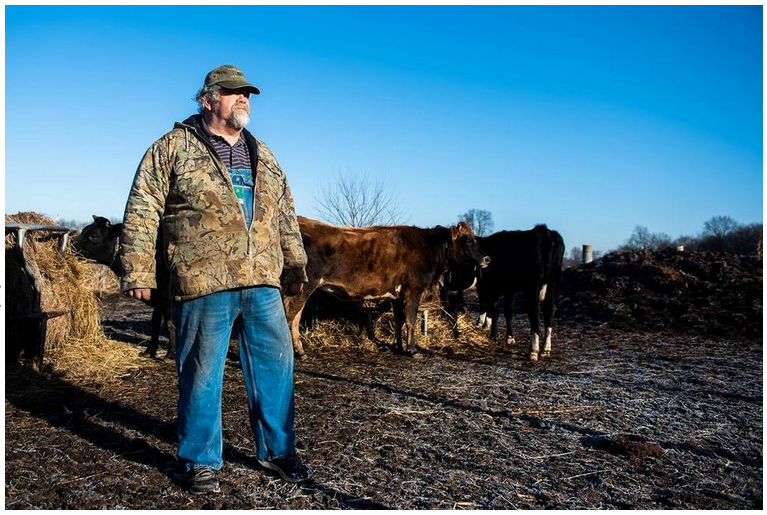Times Herald-Record: Growing number of local dairy farms shutting down

Farmer Bill Hoesktra poses for a portrait at his family farm in Montgomery. – Kelly Marsh/For the Times Herald-Record
by Judy Rife, Times Herald-Record | December 25, 2018
Seven of Orange County’s remaining 40 dairy farmers have quietly sold their herds and stopped producing milk in recent months, beginning an exodus from a storied industry that they predict will continue into the new year and beyond.
“Everybody who’s milking cows is in trouble now,″ said Mike Hosking, a third-generation dairy farmer in Mount Hope who sold his herd in October. “For the past four years, we’ve been getting paid the same amount for our milk as we got paid 20 years ago, and it’s finally taking its toll.”
Hosking, whose barn was destroyed in a fire in 2014, said he never would have rebuilt it – and depleted his savings when insurance fell short – had he known the business would get this bad.
“I would have gone out then,″ Hosking said.
The dairy industry in much of the country has been in free fall, a result of increasing supply and decreasing demand. Americans simply don’t drink as much milk as they used to, and producers of still-popular butter, cheese, ice cream and yogurt have only been able to absorb so much of the surplus.
Processors, as a result, have canceled purchase contracts with little notice, forcing dairy farmers to scramble to find new buyers for their milk or go out of business.
Six of Sullivan County’s 18 dairy farmers lost their contracts in May and then had them extended temporarily. Now two plans to build small creameries to process niche products are being advanced to create a more stable market for their milk.
In Orange County, the farmers had contracts, but that security alone couldn’t overcome a combination of other personal and financial pressures.
“I guess you could say my son and I – he’s past 60 and I’m past 80 – more or less decided to retire,″ said Wisner Buckbee Sr., co-owner of the 500-acre Wisner Farms in Warwick. “Everybody is losing money and going out. I think all the dairies in the county will be gone within five years.”
Bill Hoekstra of Montgomery, who sold his remaining 55 cows in September for half what they were worth four years ago, said the “totally unbalanced financial equation” finally did him in.
“Nobody’s happy about going out like this,″ Hoekstra sdaid. “But how long can you keep rolling a rock uphill only to have it roll back over you? When your dairy agent tells you he doesn’t think milk prices are going to get any better?”
Winnie Gros of Pine Bush said she and her husband, Jake, were squeezed financially, too: “We can handle the ups and downs – you expect them in farming – but when you’re down for so long and there’s no up in sight, you can’t survive.”
The other closing dairies are James Ballard in Campbell Hall, Dean Vellenga in Westtown and George Constable in Unionville.
“I think by spring a few more will be gone,″ said Rachel Moody, the equine/livestock educator at Cornell Cooperative Extension Orange County. “Besides milk prices, the weather this year has kicked them when they were down.”
This season’s constant rain cut yields of hay and corn for many farmers, adding the unanticipated expense of buying silage to feed their herds to their bills. Hosking said, for example, a tractor-trailer load of hay cost upwards of $8,000 and would only last his 100-plus cows about 45 days.
The farms, collectively, represent more than 2,500 acres of fields and pastures that their owners intend to keep in active use in the short term to preserve the agricultural assessments that lower property taxes.
“We’ve got a lot of tillable acres and we’re going to have to make a lot of changes,″ Buckbee said.
He and other farmers think hay could be a viable cash crop since, as Hoekstra pointed out, there are probably as many horses as cows in the county today.
“We did well enough with hay this year that we were able to sell some, but there’s no guarantee that will be the case next year,″ Gros said. “We’ve made no decisions. It’s all still too new.”
The farmers also held their heifers back from auction to grow on for two years and then sell at the peak of their value – when they are about to produce their first calves, their udders have descended and their potential as milk cows can be assessed.
Hosking, who kept about 40 calves, said he may keep his hand in the business by raising and selling breeding stock, since most of his prize Holsteins with their choice pedigrees sold “pretty well” to breeders throughout the Northeast.
“I guess I should think about retiring, but I’ve been doing this all my life – it’s all I’ve ever wanted to do – and I think I still have some good years in me,″ said the 60-something Hosking.
But demand for cows, like the milk they produce, has fallen along with prices, robbing farmers of a source of equity that they used to be able to borrow against.
“What this is, for all of us, really, is a step into the great unknown,″ Hoekstra said.